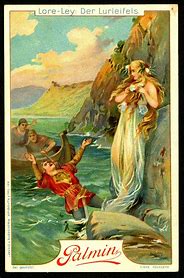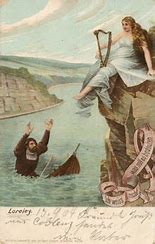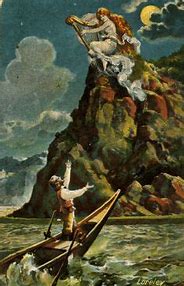Beware the Lorelei Rock - A Warning on the Single Market
Now, this article is not about spiritual subjects and it does not touch upon the mystical in any way, shape or form. It is a commentary on something that concerns me deeply, namely the rhetoric we hear on the subject of Brexit, and what our views on that might mean to others.
Politics and faith are not mutually exclusive, and one like the other creates waves and patterns of differences and agreements which may lead to chaos or order at different times, in different places and in various degrees. However, what riles the most about the ongoing and lingering rancour concerning the subject and the case for the UK to "rejoin" the EU, are the oft-repeated comments made by clearly (or at least nominally) well-educated and usually well-intentioned people along the lines that "everyone" is a racist or ignoramus if they exercised their vote to quit the EU in 2016. Those who espouse such views typically manifest as middle-class, over-privileged products of the UK schooling system, and as people who stood to lose the most from the UK's withdrawal. By which I mean monied, white collar professionals, academics or students who regard Brexit as a very (very) bad thing.
I have been a lawyer for close on 30 years, and know well enough the people by whom these comments are made, and to whom they are so directed. However, as a lawyer I also know that everyone is entitled to rights under the law and, above all, that they require to be heard and defended. I also understand how the Single Market works and why the UK should never again be part of it.
We may agree that trade agreements accommodate some countries or industries better than others. This means economic loss occurs to someone. That is just a fact of the jungle we all live in, and a consequence of contracts between two parties which exclude others However, one significant consequence of a single market created between countries – a single, unified and mutually exclusive trading bloc – is that it must be enforced, protected, and imposed upon to work. This impacts sovereignty and control over the "rules of the club" for millions. And, whether we care to acknowledge this as a fact or not, it creates a democratic deficit.
means economic loss occurs to someone. That is just a fact of the jungle we all live in, and a consequence of contracts between two parties which exclude others However, one significant consequence of a single market created between countries – a single, unified and mutually exclusive trading bloc – is that it must be enforced, protected, and imposed upon to work. This impacts sovereignty and control over the "rules of the club" for millions. And, whether we care to acknowledge this as a fact or not, it creates a democratic deficit.
In a single market comprised of different countries, no one country has the right to refuse products considered acceptable by the other members. Likewise, it cannot sell goods or services to which the bloc does not agree. Thus, it is necessary to suppress some areas and develop others to create a platform that can work across divergent economies with different needs, skills and target markets. This causes a net loss for some members and a net gain for others. This is also why some countries are net contributors to the EU budget – which is to say, they have to pay more to be in the bloc, and whose money is not spent on their own workforce but on someone else's. There is no remedy to this conflict of interest other than for the net losers to gain something in return. Perhaps political influence over the net gainers and meeting strategic objectives in other ways. In the case of the UK, the principle of realignment meant surrendering its industrial base to its trading partners in exchange for influence in Europe and the promise of primacy in providing services. Britain was, therefore, reliant on the European Commission to ensure the enforcement of the Single Market's rules were fair and unbiased.
Greece, for instance, gained rapidly in the EU and built up huge government debts. But  during the 2008 global crisis it could not rebase currency in order to dig itself out of the hole it found itself in. That was because, as a member of the single currency, Euro, club rules prevented Greece from debasing its currency. This would have deflated it for everyone else (irrespective of the comparative size of the bloc's divergent economies). No, instead Greece had to be bankrolled by the most powerful members of the club to save the single currency. As a result, Greece is now effectively owned by its creditors and has learned a harsh lesson about what true independence means. On the other hand, the UK, which was not a member of the single currency, could adapt its fiscal response accordingly. The lesson here is that to work, a single market with a single currency must be governed harshly for its rules to be enforced. Which also makes it a very good thing that Tony Blair did not get his way by bringing the UK into the Eurozone a quarter of a century ago.
during the 2008 global crisis it could not rebase currency in order to dig itself out of the hole it found itself in. That was because, as a member of the single currency, Euro, club rules prevented Greece from debasing its currency. This would have deflated it for everyone else (irrespective of the comparative size of the bloc's divergent economies). No, instead Greece had to be bankrolled by the most powerful members of the club to save the single currency. As a result, Greece is now effectively owned by its creditors and has learned a harsh lesson about what true independence means. On the other hand, the UK, which was not a member of the single currency, could adapt its fiscal response accordingly. The lesson here is that to work, a single market with a single currency must be governed harshly for its rules to be enforced. Which also makes it a very good thing that Tony Blair did not get his way by bringing the UK into the Eurozone a quarter of a century ago.
The rule-maker in the EU is the European Commission, which monitors EU laws and enforces Single Market compliance. The European Court of Justice enforces any rules in dispute and so is designed to be an arbiter to ensure fairness. The problem, however, with the European Commission is that it is democratically unaccountable. Which means that it is insulated from democratic contestation. So, too, is the arbiter of EU law, the European Court of Justice, whose judiciary is appointed by a panel selected by national governments. No country's citizens have voted for the Commissioners, nor can the electorate of any remove them.
Indeed, democracy is interpreted and applied differently across the EU. This is natural enough in the historical context, as you would expect. Each state's legal systems and governance have developed over hundreds of years, even if many have had a very brief period of democracy following the end of the Second World War. However, it means the variance in the strength of democracy in EU states is vast. Of course, this is not the case with single markets such as the United States, whose fifty common law jurisdictions share federal governance derived at the nation's very beginning and whose common language and culture is distinctively American. Europe is different. Indeed, even the European Parliament (renowned for its own scandals and expense abuses) has questioned the democratic legitimacy of the European Commission and Court of Justice.
In any event, Members of the European Parliament (MEPs) divide into supranational political blocs (some of which are quite extreme). In many instances, the political representatives of national parties voted for by the citizens of member states broadly adhere with one another (e.g. the EPP (European Peoples' Party) and the PfE (Patriots for Europe). The Parliament's powers are limited, and it cannot statutorily amend EU Institutions, which also means that it cannot tackle corruption within the European Commission and Court of Justice. This is a democratic deficit which ultimately prevents individual EU member states from protecting the interests of their citizens. It may be said that the whole infrastructure of the EU subverts democracy since the appurtenant risk of increasing the Parliament's powers to allow it to hold the Commission to account could be even more dangerous. It is as if the architects of the EU's constitution intentionally blunted the Parliament's reach because they feared a repeat of the rise of something akin to the rise of fascism in the early to mid-twentieth century; itself a manifestation of the very existence of cultural bases where the meaning of democracy is interpreted so differently.
citizens of member states broadly adhere with one another (e.g. the EPP (European Peoples' Party) and the PfE (Patriots for Europe). The Parliament's powers are limited, and it cannot statutorily amend EU Institutions, which also means that it cannot tackle corruption within the European Commission and Court of Justice. This is a democratic deficit which ultimately prevents individual EU member states from protecting the interests of their citizens. It may be said that the whole infrastructure of the EU subverts democracy since the appurtenant risk of increasing the Parliament's powers to allow it to hold the Commission to account could be even more dangerous. It is as if the architects of the EU's constitution intentionally blunted the Parliament's reach because they feared a repeat of the rise of something akin to the rise of fascism in the early to mid-twentieth century; itself a manifestation of the very existence of cultural bases where the meaning of democracy is interpreted so differently.
Be that as it may, member states' national governments select the all-powerful European Commissioners, many of which have proved disastrous. The most notable and famous instances of corruption in the Commission include the "Lux Leaks Scandal" after Commission President Jean-Claude Juncker, who got caught brokering preferential tax deals for multinationals in his own country. However, no one voted for him to be President, let alone a Commissioner. Yet he was in charge of an institution enforcing the rules of the EU's Single Market. Then there was Jacques  Santer, then Head of the European Commission, who was guilty of nepotism on an unimaginable scale. Alternatively, there is the example of Edith Cresson, a former dentist of the French President whom he appointed to a six-figure salary. What about the Galvin Report, which revealed massive expenses and allowances fraud by no less than 160 randomly selected MEPs? The report was even kept secret by the EU for years. Then there was Ernst Strasser, one of 3 MEPs caught taking bungs to change European law on behalf of secret business investors. Or what about the budget fraud around farming payments and the channelling of funds to terrorist groups (yep, that happened). Malpractice, fraud and corruption are a byword for the EU; but what constitutes such practises is very divergent indeed within different European cultures.
Santer, then Head of the European Commission, who was guilty of nepotism on an unimaginable scale. Alternatively, there is the example of Edith Cresson, a former dentist of the French President whom he appointed to a six-figure salary. What about the Galvin Report, which revealed massive expenses and allowances fraud by no less than 160 randomly selected MEPs? The report was even kept secret by the EU for years. Then there was Ernst Strasser, one of 3 MEPs caught taking bungs to change European law on behalf of secret business investors. Or what about the budget fraud around farming payments and the channelling of funds to terrorist groups (yep, that happened). Malpractice, fraud and corruption are a byword for the EU; but what constitutes such practises is very divergent indeed within different European cultures.
The corruption and gerrymandering within the EU are monumental and primarily driven by divergent views on what they entail or what should be done about it. Indeed, member states appear content to ensure that the interests of EU citizens are overvoted and overlooked, because there is no democratic mechanism to select the very people who make and break the rules. Having said all of that - and if that is not a good enough reason for the citizenry of a member state to withdraw from the EU - the very principle of a single market is in and of itself truly elitist. The affrontery of a bloc that criticises the United States of abusing its power comes from a bloc which created the Frankenstein's Monster of its Single Market, operating to the exclusion of ALL countries outside of it. Double standards, or clever double dealing? It kind depends on your point of view, which is precisely the point I am making, since one glove does not fit all. And if the glove don't fit, you must quit.
The rules of the Single Market are why Britain was obliged to stop trading preferentially with Australia, Canada, New Zealand and India; and also why products often undeniably superior to those produced within the EU cannot be easily purchased within it (because tariffs price them out). A good example of this, and which is close to my heart as a supporter of Palestinian independence, is the tax treatment of goods imported from the West Bank. If you wish to buy Palestinian olive oil and baulk at its price in the supermarkets, consider first that it must go through red tape, restrictions and draconian levies imposed by Israel, through which the product must first pass to reach the outside world. This is because the West Bank has no international airport; it is not a contiguous territory, and its occupants have no citizenship or status. Then, once it reaches the EU, it is taxed all over again because Israel (the exporting country) is not a member of the Single Market. The net result for the Palestinian farmer is that he gets double-teamed by both Israel and its friends in the EU (which is what Israel wants anyway because it restricts the market for Palestinian products). The EU is implicit in this repression, and the blood of the Palestinians, I can assure you, is just as red as ours and flows just as freely). Where is the justice in this? If you want to talk about ethics, and how other men bleed when repressed and need to be treated equally, consider first the existence of the EU.
and draconian levies imposed by Israel, through which the product must first pass to reach the outside world. This is because the West Bank has no international airport; it is not a contiguous territory, and its occupants have no citizenship or status. Then, once it reaches the EU, it is taxed all over again because Israel (the exporting country) is not a member of the Single Market. The net result for the Palestinian farmer is that he gets double-teamed by both Israel and its friends in the EU (which is what Israel wants anyway because it restricts the market for Palestinian products). The EU is implicit in this repression, and the blood of the Palestinians, I can assure you, is just as red as ours and flows just as freely). Where is the justice in this? If you want to talk about ethics, and how other men bleed when repressed and need to be treated equally, consider first the existence of the EU.
Remarks along the lines that all Brexit-backers are nationalists, racists or delusional should be taken off the script and trashed for the nonsense they are. Think again, because there is far more to it, and only free and fair global trade is the truly ethical solution. I am sorry to reveal to such people that many equally well-educated and reasonable people chose Leave in the UK Referendum. And they did so because of the democratic deficit. Some, perhaps, for the equally valid but associated reason that the destruction of Britain's industrial and manufacturing base was too high a price to pay for what was received in turn.
For most working people, the obvious benefits of the EU, such as seemless travel between countries in which to live and work, travelling visa-free on vacation (if you could afford to), and reaching one's holiday home in Tuscany or Spain without undue inconvenience, were grossly insufficient reasons to vote Remain. Today, the embittered anti-Brexiteers are as the sirens on the Lorelei rocks of the Rhine. upon which many ships in antiquity foundered. Just as the Rhine is the artery of Germany and the symbolic centre of her trade, so too the Lorelei are a place of submerged dangers, and a warning to the hubris of those who believe the EU to be an idle and harmless free ride. Just as the sirens sang to mariners and caused them to drown, so too are the sweet voices of the Rejoiners chanting in chorus: "Avast ye! Make haste, Rejoin! Take the easy passage of the river!"
Article (c) M.R. Osborne, 2025






